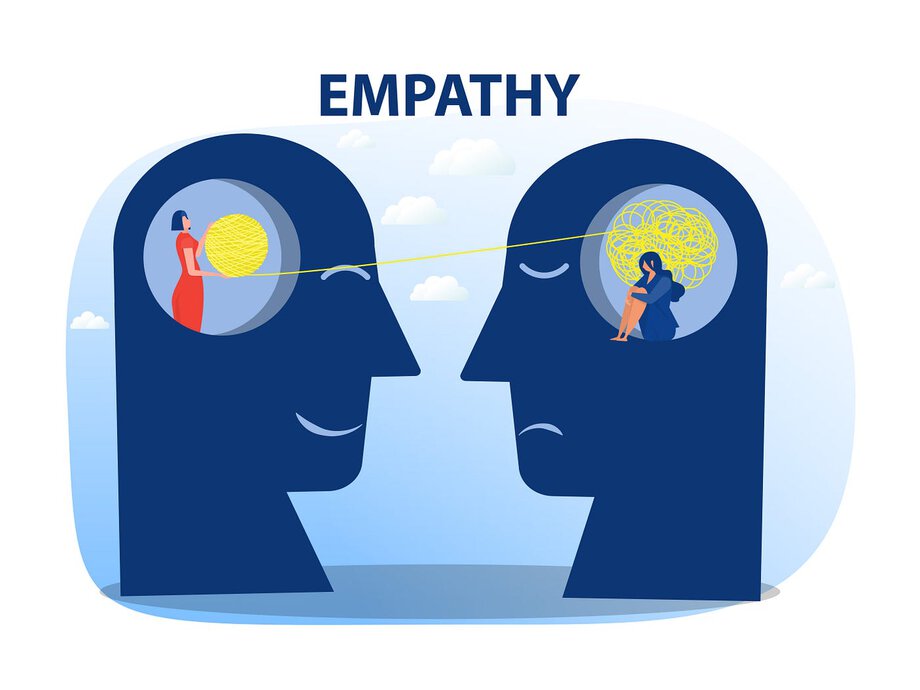Why Empathy And Understanding Are Crucial In Dating

Are you struggling to find success in your dating life?
Do you often feel frustrated or misunderstood by your partner?
The key to building a strong and fulfilling relationship lies in cultivating empathy and understanding.
In this article, we will explore why these qualities are crucial in dating and how they can positively impact your romantic connections.
By actively putting yourself in your partner’s shoes, you can develop a deeper emotional connection and foster a sense of trust and security.
Additionally, navigating differences and resolving conflicts becomes easier when you approach them with empathy and a willingness to understand each other’s perspectives.
Furthermore, by cultivating empathy for yourself and others, you create an environment of mutual growth and development.
Ultimately, developing these skills will help you overcome challenges, build resilience, and develop a healthy and balanced relationship.
So, let’s dive in and discover the power of empathy and understanding in the world of dating.
Key Takeaways
- Empathy and understanding enhance the dating experience by fostering intimacy and deepening the connection between partners.
- Incorporating empathy and understanding practices in dating shows genuine care and concern for the partner’s thoughts and feelings.
- Developing empathy and understanding skills helps navigate conflicts and challenges in a relationship, leading to effective communication and conflict resolution.
- Empathy and understanding are essential in creating a safe and supportive space for expressing needs and expectations in a dating relationship.
The Importance of Emotional Connection
You need to understand that without a strong emotional connection, your dating experiences will lack depth and meaning. Building trust is an essential part of establishing this connection.
When you trust someone, you’re more likely to open up emotionally and be vulnerable. Vulnerability and emotional openness allow for a deeper understanding of each other’s needs, desires, and fears. It creates a safe space where you can share your true selves without judgment or fear of rejection.
This emotional connection forms the foundation for a healthy and fulfilling relationship. With this understanding, you can navigate differences and resolve conflicts with empathy and understanding. It enables you to approach disagreements with a willingness to listen, compromise, and find common ground.
By prioritizing emotional connection, you can build a strong and lasting bond with your partner.
When it comes to navigating differences and resolving conflicts in dating, it’s essential to embrace different perspectives.
By understanding and appreciating each other’s point of view, you can find common ground and work towards a resolution.
Effective communication and active listening are also crucial in addressing conflicts and finding solutions that satisfy both partners.
Embracing Different Perspectives
Although it may initially seem challenging, embracing different perspectives is an integral aspect of developing empathy and understanding in dating. By actively seeking out and valuing different viewpoints, you can broaden your own understanding of the world and gain a deeper appreciation for the experiences and emotions of others.
This process involves engaging in empathy exercises that encourage you to step into someone else’s shoes and see the world from their perspective. Understanding different perspectives allows you to recognize the diverse backgrounds, values, and beliefs that shape individuals, fostering a greater sense of empathy and compassion.
It is through this open-mindedness and willingness to embrace different perspectives that you can truly connect with your partner on a deeper level. As you continue on your journey towards building empathy and understanding, the next step is to explore effective communication and active listening in dating.
Effective Communication and Active Listening
By practicing effective communication and active listening, you can establish a strong connection and foster deeper understanding in your relationships. Effective communication involves expressing your thoughts, feelings, and needs openly and honestly, while also being attentive to your partner’s communication style and preferences.
This means actively listening to what they have to say, without interrupting or judgment. Active listening requires giving your full attention, asking clarifying questions, and summarizing what you have heard to ensure understanding.
When both partners engage in effective communication and active listening, they create a safe and supportive space for vulnerability and emotional intimacy. This allows for a deeper connection to form and paves the way for finding common ground in the relationship, where shared values and interests can be discovered and cultivated.
Finding Common Ground
Establishing a strong connection and fostering deeper understanding in relationships involves actively seeking out common ground. It’s important to find shared interests to create a foundation for a healthy relationship. This can be done by exploring hobbies, activities, or even values that both partners enjoy.
Shared interests provide opportunities for bonding and create a sense of belonging. Additionally, compromise and flexibility are key in finding common ground. Both partners should be willing to make concessions and adapt to each other’s preferences. This shows a willingness to meet halfway and fosters a sense of equality in the relationship.
By finding common ground through shared interests and practicing compromise, a couple can build a solid foundation and strengthen their connection. This understanding and mutual respect will pave the way for cultivating empathy for yourself and others, which will be discussed in the next section.
Cultivating Empathy for Yourself and Others
Developing a deep sense of empathy allows you to truly connect with others and understand their experiences and emotions. It starts with developing empathy within oneself. By taking the time to reflect on your own feelings and experiences, you can better understand and relate to the emotions of others.
Cultivating empathy in relationships is also crucial. It involves actively listening to your partner, putting yourself in their shoes, and trying to understand their perspective. This helps create a safe and nurturing environment where both individuals feel understood and supported. By fostering empathy, you can build stronger and more meaningful connections with your partner.
It sets the foundation for fostering mutual growth and development in your relationship. Understanding and empathizing with each other’s goals and aspirations allows you to support and encourage one another, ultimately leading to a stronger bond.
Fostering Mutual Growth and Development
Now that you’ve cultivated empathy for yourself and others, it’s time to focus on fostering mutual growth and development in your dating experiences. Building a strong foundation of mutual support is essential for a healthy and fulfilling relationship. When you both commit to encouraging each other’s personal growth, you create an environment that allows both individuals to thrive.
Here are five ways to foster mutual growth and development in your relationship:
- Actively listen to each other’s goals and dreams.
- Offer constructive feedback and encouragement.
- Engage in open and honest communication.
- Support each other’s passions and interests.
- Celebrate each other’s achievements and milestones.
By embracing these practices, you create a relationship where both partners feel valued and supported in their personal growth journey. This sets the stage for overcoming challenges and building resilience in your relationship.
Overcoming Challenges and Building Resilience
When it comes to dating, setbacks and disappointments are inevitable. But the key is to not let them define you or discourage you from pursuing love. Instead, use these experiences as opportunities to learn and grow, building emotional resilience and coping skills along the way.
Dealing with Setbacks and Disappointments
Despite our best efforts, we can’t always control the outcome of our dating experiences, and it’s important to handle setbacks and disappointments with empathy and understanding.
Dealing with rejection is never easy, but it’s crucial to remember that everyone has their own preferences and reasons for their decisions. Instead of taking it personally, try to see it as an opportunity to grow and learn.
Managing expectations is also key in navigating setbacks. It’s important to have realistic expectations and understand that not every date will lead to a long-term relationship.
By approaching setbacks with empathy and understanding, you can maintain a positive mindset and continue on your dating journey.
Learning from past relationship experiences is the next step in personal growth and finding the right partner.
Learning from Past Relationship Experiences
It’s essential to reflect on past relationships and learn from them in order to grow and find the right partner.
One of the most valuable lessons that past relationships teach us is learning from our mistakes. By examining our actions and behaviors in previous relationships, we can identify patterns and areas for improvement. This self-reflection allows us to grow and develop as individuals, making us better equipped for future relationships.
Additionally, the healing process from past relationship experiences is an important part of personal growth. It’s crucial to take the time to heal and process any unresolved emotions or traumas before entering a new relationship. This ensures that we bring our best selves to the table and avoid repeating past mistakes.
By learning from our past, we can build emotional resilience and coping skills that will benefit us in our journey towards finding a fulfilling and healthy partnership.
Building Emotional Resilience and Coping Skills
Developing emotional resilience and coping skills is key to navigating the ups and downs of relationships and ultimately finding a lasting and fulfilling partnership. Building emotional intelligence is an essential part of this process. It involves understanding and managing your own emotions, as well as being able to empathize with and understand the emotions of your partner. This allows you to communicate effectively and resolve conflicts in a healthy and constructive way.
In addition, learning how to cope with rejection is crucial in dating. Rejection is a natural part of the process and can be quite challenging to handle. By developing coping skills, such as self-reflection, self-care, and seeking support from friends or a therapist, you can bounce back from rejection and maintain a positive outlook on dating.
By building emotional resilience and mastering coping skills, you are better equipped to develop a healthy and balanced relationship. This involves maintaining open communication, setting boundaries, and prioritizing your own well-being alongside your partner’s.
Developing a Healthy and Balanced Relationship
To develop a healthy and balanced relationship, it’s important to set boundaries and respect each other’s needs. This means understanding and communicating your personal limits and understanding and respecting your partner’s limits as well.
Additionally, finding a balance between independence and togetherness is crucial. It’s important to maintain your individuality and pursue your own interests, while also making time to nurture the connection and intimacy in your relationship.
Setting Boundaries and Respecting Each Other’s Needs
Understanding and respecting each other’s boundaries is essential in dating, as it allows you to create a strong foundation built on trust and mutual understanding. When you establish boundaries, you’re setting clear guidelines for what you’re comfortable with and what you need from your partner.
By doing so, you create a safe space where both of you can express your needs and have them met. Respecting each other’s boundaries shows that you value and care for one another, fostering a sense of security and emotional intimacy. It also helps prevent misunderstandings and conflicts, as both partners know what’s expected and what’s off-limits.
Setting boundaries and respecting each other’s needs serves as a stepping stone towards balancing independence and togetherness in your relationship, allowing you to grow together while maintaining your individuality.
Balancing Independence and Togetherness
Now that you’ve established boundaries and learned to respect each other’s needs, it’s time to explore how to balance independence and togetherness in your relationship.
While it’s important to spend quality time together, it’s equally crucial to find personal space and prioritize independence. This means allowing each other to pursue individual interests, hobbies, and friendships. By giving each other the freedom to explore personal growth and independence, you strengthen the foundation of your relationship.
Balancing independence and togetherness not only allows you to maintain a sense of self, but it also creates a healthy dynamic where both partners can thrive. As you navigate this delicate balance, remember to communicate openly and honestly about your needs and expectations. This will ensure that both partners feel valued and respected.
Transitioning into the next section, let’s explore how nurturing intimacy and connection can enhance your relationship even further.
Nurturing Intimacy and Connection
Finding personal space and prioritizing independence is essential in maintaining a healthy balance in your relationship, allowing both partners to thrive and grow individually. However, nurturing intimacy and connection is equally important in building a strong and lasting bond.
Here are four ways to deepen your connection and build trust with your partner:
- Active Listening: Show genuine interest in your partner’s thoughts and feelings. Pay attention, ask questions, and validate their emotions.
- Vulnerability: Open up and share your fears, dreams, and insecurities. Creating a safe space for vulnerability fosters a deeper understanding and emotional connection.
- Quality Time: Prioritize quality time together, free from distractions. Engage in activities that promote bonding and strengthen the emotional bond between you.
- Empathy and Understanding: Put yourself in your partner’s shoes and strive to understand their perspective. Show empathy and support, even during challenging times.
By incorporating these practices into your relationship, you can nurture intimacy, deepen your connection, and build a foundation of trust that will strengthen your bond.
Frequently Asked Questions
How can I improve my emotional connection with my partner?
To improve your emotional connection with your partner, try practicing active listening, expressing your emotions openly, and showing empathy and understanding. These techniques for effective communication can deepen emotional intimacy in your relationship.
What are some practical strategies for resolving conflicts in a relationship?
To resolve conflicts in your relationship, practice effective communication by actively listening and expressing your feelings and needs. Set boundaries to ensure both partners feel respected and supported.
How can I cultivate empathy for myself and others in the dating process?
Develop self-awareness by reflecting on your own emotions and experiences. This will help you understand and empathize with others. Building trust involves listening, validating feelings, and being open and honest in your communication.
What are some ways to ensure mutual growth and development in a relationship?
To ensure mutual growth and development in your relationship, use communication techniques and establish shared goals. Regularly discuss your aspirations and work together towards them, fostering a strong and supportive partnership.
How do we overcome challenges and build resilience as a couple?
To overcome setbacks and build resilience as a couple, you must face challenges together, communicate openly, and support each other. Building trust is crucial, as it creates a strong foundation for overcoming obstacles and growing together.










